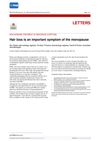 47 citations,
October 2016 in “Molecular and Cellular Endocrinology”
47 citations,
October 2016 in “Molecular and Cellular Endocrinology” Androgens prevent hair growth by changing Wnt signals in cells.
 1 citations,
November 2014
1 citations,
November 2014 The document explains hair and nail biology, common hair loss conditions and treatments, oral and genital skin diseases, and the risks and treatments associated with squamous cell carcinoma.
 August 2022 in “RECISATEC”
August 2022 in “RECISATEC” Female pattern hair loss is common, often starts in the 30s or 40s, worsens after menopause, and can negatively affect quality of life.
 3 citations,
February 2005 in “Expert Opinion on Investigational Drugs”
3 citations,
February 2005 in “Expert Opinion on Investigational Drugs” New treatments for hair loss are being developed using molecular biology.
 September 2015 in “SelfCare Journal”
September 2015 in “SelfCare Journal” Two treatments for male pattern hair loss are minoxidil and finasteride, but they have side effects and may not satisfy everyone.
1 citations,
August 2021 in “Arhivʺ vnutrennej mediciny” Hormonal imbalances can cause hair loss, and understanding them can help develop better treatments.
Researchers developed a quick and accurate method to measure hormones in urine, confirming a baldness treatment's effectiveness without altering hormone levels.
 1 citations,
January 2018 in “BMJ”
1 citations,
January 2018 in “BMJ” Many women experience significant hair loss during menopause, and topical minoxidil is an effective treatment.
 15 citations,
June 2020 in “Experimental Dermatology”
15 citations,
June 2020 in “Experimental Dermatology” Hormones and genes affect hair growth and male baldness.
1 citations,
October 2020 in “Galen Medical Journal” Bald men may have a higher risk of heart disease, but baldness doesn't necessarily mean more severe heart disease.
 7 citations,
September 2020 in “Journal of Cosmetic Dermatology”
7 citations,
September 2020 in “Journal of Cosmetic Dermatology” Serum biomarkers like insulin-like growth factor-1 and vitamin D may help diagnose androgenetic alopecia.
 47 citations,
September 2016 in “Reviews in endocrine and metabolic disorders”
47 citations,
September 2016 in “Reviews in endocrine and metabolic disorders” The skin's ability to produce hormones is linked to various skin conditions, and better understanding this process could lead to new treatments.
 18 citations,
July 2020 in “Basic and Clinical Andrology”
18 citations,
July 2020 in “Basic and Clinical Andrology” Wait 3 months after COVID-19 before trying assisted reproduction and further research is needed on COVID-19's effects on male hormones and fertility.
 6 citations,
January 2013 in “Genetics and Molecular Research”
6 citations,
January 2013 in “Genetics and Molecular Research” Women with hair loss have more androgen receptors in certain hair follicles.
 176 citations,
May 2020 in “Dermatologic Therapy”
176 citations,
May 2020 in “Dermatologic Therapy” COVID-19 can cause different skin symptoms that may help with early diagnosis and show how severe the disease is.

The document concludes that hair loss in women can be treated with topical treatments or hormone therapy depending on the cause.
 54 citations,
July 2002 in “Clinical and Experimental Dermatology”
54 citations,
July 2002 in “Clinical and Experimental Dermatology” DHT, a testosterone byproduct, causes male pattern baldness.
 1 citations,
October 2015 in “Renal Failure”
1 citations,
October 2015 in “Renal Failure” Hair loss linked to kidney stones in people under 60.
 1 citations,
October 2019 in “مجله كليه طب الكندي”
1 citations,
October 2019 in “مجله كليه طب الكندي” Dapsone gel 5% is effective and safe for treating acne.
 July 2023 in “International journal of dermatology, venereology and leprosy sciences”
July 2023 in “International journal of dermatology, venereology and leprosy sciences” New treatments are being explored to slow or reverse hereditary hair loss.
9 citations,
July 1993 in “The journal of investigative dermatology/Journal of investigative dermatology” Sex hormones and antiandrogens can either stimulate or inhibit human hair follicle cell growth depending on the dose.
 20 citations,
April 2006 in “Dermatologic Clinics”
20 citations,
April 2006 in “Dermatologic Clinics” Antiandrogen therapies are beneficial for treating skin and hair conditions related to androgen levels.
 51 citations,
September 2015 in “Medical Clinics of North America”
51 citations,
September 2015 in “Medical Clinics of North America” The conclusion is that acne, alopecia, and hyperhidrosis are common skin issues with various treatments available, and accurate diagnosis is key for effective management.
 December 2015 in “Vestnik dermatologii i venerologii”
December 2015 in “Vestnik dermatologii i venerologii” People with hair loss have different hormone levels, and these hormones can affect hair growth.
 December 2022 in “International Journal of Biomedicine”
December 2022 in “International Journal of Biomedicine” Androgens may worsen COVID-19 and hair loss could indicate the disease's severity.
 July 2015 in “Cambridge University Press eBooks”
July 2015 in “Cambridge University Press eBooks” Androgens like testosterone affect skin health and can lead to conditions such as acne and hair loss, with various treatments available.
 7 citations,
June 2019 in “Australasian Journal of Dermatology”
7 citations,
June 2019 in “Australasian Journal of Dermatology” AGA in children needs careful diagnosis due to low androgen levels and possible other causes.
4 citations,
April 2018 in “Journal of Mind and Medical Sciences” Patients should discuss risks with doctors before using finasteride for hair loss.
 134 citations,
April 2020 in “Journal of Cosmetic Dermatology”
134 citations,
April 2020 in “Journal of Cosmetic Dermatology” Male pattern hair loss could hint at androgens affecting COVID-19 severity.
 116 citations,
September 2001 in “Journal of The American Academy of Dermatology”
116 citations,
September 2001 in “Journal of The American Academy of Dermatology” Hair loss occurs due to fewer papillary cells, smaller follicles, and shorter growth phases.

























